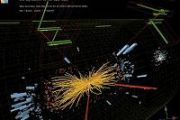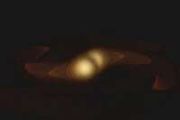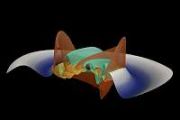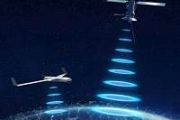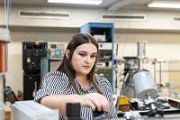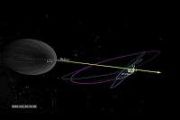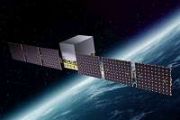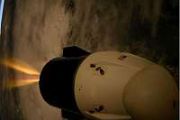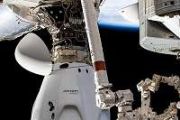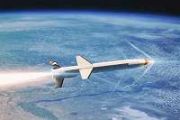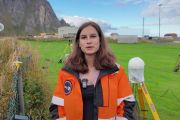
Copernical Team
Powerful Arab League communications satellite ready for night launch
 A powerful communication relay satellite for the 21-member Arab League is scheduled for launch Tuesday from Cape Canaveral Space Force Station in Florida. weather permitting.
SpaceX plans to carry ARABSAT BADR-8 satellite into a geosynchronous transfer orbit aboard a Falcon 9 rocket from Launch Complex 40, with a 127-minute window that opens at 11:25 p.m. EDT.
However, forecasters ha
A powerful communication relay satellite for the 21-member Arab League is scheduled for launch Tuesday from Cape Canaveral Space Force Station in Florida. weather permitting.
SpaceX plans to carry ARABSAT BADR-8 satellite into a geosynchronous transfer orbit aboard a Falcon 9 rocket from Launch Complex 40, with a 127-minute window that opens at 11:25 p.m. EDT.
However, forecasters ha Mainland, Macao put 2 satellites into orbit
 China launched two science satellites on Sunday afternoon jointly developed by scientists from the mainland and Macao, according to the China National Space Administration.
The Macao Science Satellite 1A and 1B were carried by a Long March 2C carrier rocket that lifted off at 4 pm from the Jiuquan Satellite Launch Center in northwestern China's Gobi Desert.
The launch marks the 474th
China launched two science satellites on Sunday afternoon jointly developed by scientists from the mainland and Macao, according to the China National Space Administration.
The Macao Science Satellite 1A and 1B were carried by a Long March 2C carrier rocket that lifted off at 4 pm from the Jiuquan Satellite Launch Center in northwestern China's Gobi Desert.
The launch marks the 474th Gogo elevates its global broadband offering with second, higher throughput antenna
 Gogo Business Aviation (NASDAQ: GOGO) has announced its Gogo Galileo product line with the unveiling of a second electronically steered antenna (ESA) form factor for use on its Low Earth Orbit (LEO) broadband solution.
Gogo Galileo now offers two fuselage-mount antennas - the previously announced "HDX" antenna, designed with a small form factor to fit on any size business aircraft, and tod
Gogo Business Aviation (NASDAQ: GOGO) has announced its Gogo Galileo product line with the unveiling of a second electronically steered antenna (ESA) form factor for use on its Low Earth Orbit (LEO) broadband solution.
Gogo Galileo now offers two fuselage-mount antennas - the previously announced "HDX" antenna, designed with a small form factor to fit on any size business aircraft, and tod Inmarsat's expands inflight broadband plans for business aviation customers
 Inmarsat has announced the next chapter of its market-leading Jet ConneX (JX) inflight broadband solution, with a new range of service plans introduced to redefine gold standard connectivity in the business aviation market and satisfy even the most data-hungry users for many years to come.
Launched as part of Inmarsat's JX Evolution programme, these latest service plans are available for n
Inmarsat has announced the next chapter of its market-leading Jet ConneX (JX) inflight broadband solution, with a new range of service plans introduced to redefine gold standard connectivity in the business aviation market and satisfy even the most data-hungry users for many years to come.
Launched as part of Inmarsat's JX Evolution programme, these latest service plans are available for n NASA's Hubble hunts for intermediate-sized black hole close to home
 Astronomers using NASA's Hubble Space Telescope have come up with what they say is some of their best evidence yet for the presence of a rare class of "intermediate-sized" black hole that may be lurking in the heart of the closest globular star cluster to Earth, located 6,000 light-years away.
Like intense gravitational potholes in the fabric of space, virtually all black holes seem to com
Astronomers using NASA's Hubble Space Telescope have come up with what they say is some of their best evidence yet for the presence of a rare class of "intermediate-sized" black hole that may be lurking in the heart of the closest globular star cluster to Earth, located 6,000 light-years away.
Like intense gravitational potholes in the fabric of space, virtually all black holes seem to com The Huginn mission - an overview
 ESA Astronaut Andreas Mogensen will fly to the International Space Station for his second mission called Huginn, in late summer of 2023. It will be a mission of firsts for both Andreas and ESA.
The Huginn mission name, chosen by Andreas, originates in Norse mythology with Huginn and Muninn - the two raven accomplices of the god Odin. The two ravens symbolise the human mind, with Huginn rep
ESA Astronaut Andreas Mogensen will fly to the International Space Station for his second mission called Huginn, in late summer of 2023. It will be a mission of firsts for both Andreas and ESA.
The Huginn mission name, chosen by Andreas, originates in Norse mythology with Huginn and Muninn - the two raven accomplices of the god Odin. The two ravens symbolise the human mind, with Huginn rep Solar Foods one of the Phase II winners of NASA Deep Space Food Challenge
 A panel of Judges has selected Solar Foods' Solein?-producing technology as one of the winners of the Phase II of Deep Space Food Challenge. The challenge, launched in January 2021 by NASA and their Canadian counterpart organization CSA, seeks innovations to feed astronauts on long space missions.
The Deep Space Food Challenge sets strict requirements for all competitors: each concept must
A panel of Judges has selected Solar Foods' Solein?-producing technology as one of the winners of the Phase II of Deep Space Food Challenge. The challenge, launched in January 2021 by NASA and their Canadian counterpart organization CSA, seeks innovations to feed astronauts on long space missions.
The Deep Space Food Challenge sets strict requirements for all competitors: each concept must Study doubles the number of known repeating fast radio bursts
 Fast radio bursts (FRBs) are repeating flashes of radio waves that remain a source of mystery to astronomers. We do know a few things about them: FRBs originate from far outside the Milky Way, for instance, and they're probably produced from the cinders of dying stars. While many astronomical radio waves have been observed to have burst only once, some waves have been seen bursting multiple time
Fast radio bursts (FRBs) are repeating flashes of radio waves that remain a source of mystery to astronomers. We do know a few things about them: FRBs originate from far outside the Milky Way, for instance, and they're probably produced from the cinders of dying stars. While many astronomical radio waves have been observed to have burst only once, some waves have been seen bursting multiple time The search for habitable planets expands
 A University of Michigan astronomer and his team are suggesting a new way to expand the search for habitable planets that takes into account a zone not previously considered: the space between the star and what's called soot-line in planet-forming disks.
Worlds that form in this region-a disk of dust rotating around a central star from which planets may be built-could have surfaces rich in
A University of Michigan astronomer and his team are suggesting a new way to expand the search for habitable planets that takes into account a zone not previously considered: the space between the star and what's called soot-line in planet-forming disks.
Worlds that form in this region-a disk of dust rotating around a central star from which planets may be built-could have surfaces rich in Terran Orbital Announces $37.1 Million Registered Direct Offering
 Terran Orbital Corporation (NYSE: LLAP) has entered into a definitive securities purchase agreement for the purchase and sale of 29,000,000 shares of the Company's common stock (or common stock equivalents) and warrants to purchase 29,000,000 shares of common stock at a combined purchase price of $1.28 per share of common stock (or common stock equivalent) and accompanying warrant in a registere
Terran Orbital Corporation (NYSE: LLAP) has entered into a definitive securities purchase agreement for the purchase and sale of 29,000,000 shares of the Company's common stock (or common stock equivalents) and warrants to purchase 29,000,000 shares of common stock at a combined purchase price of $1.28 per share of common stock (or common stock equivalent) and accompanying warrant in a registere 




